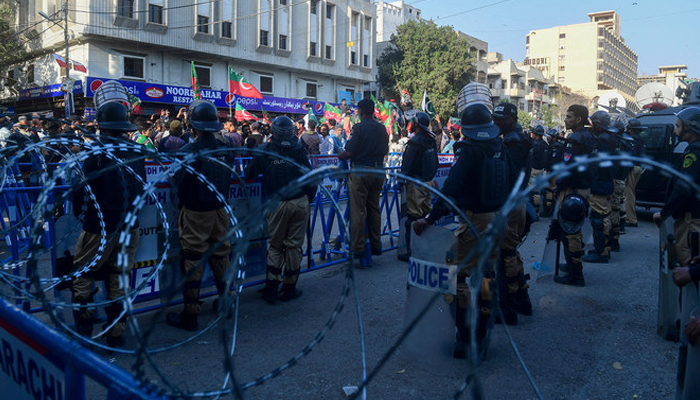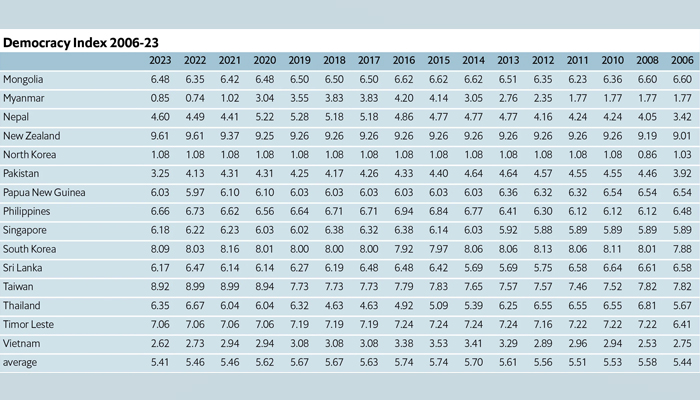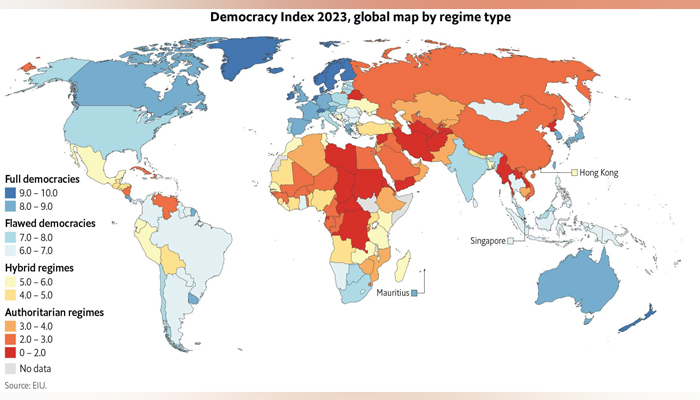EIU Democracy Index: Pakistan downgraded further
EIU Democracy Index provides snapshot of state of democracy in 165 independent states and two territories
ISLAMABAD: Pakistan has been downgraded to an “authoritarian regime” in the Economist Intelligence Unit’s (EIU) Democracy Index 2023 report, registering the greatest deterioration of any country in the region classified as “Australia and Asia”.
The EIU Democracy Index provides a snapshot of the state of democracy in 165 independent states and two territories.
Of the 28 countries in the region that are included in the index, 15 recorded a decline in their score and only eight registered an improvement.
Pakistan’s score on the Democracy Index fell by 0.88 to 3.25, resulting in a fall of 11 places in the global ranking table, to 118th.
The EIU report mentioned that alongside meddling in the electoral process and government dysfunction, the independence of the judiciary has been severely curtailed in the country.
Pakistan is the only Asian country to be downgraded, having been reclassified from a “hybrid regime” to an “authoritarian regime”.
Pakistan’s score on the democracy index remained a little over 4 since 2008. It was for the first in 2023 that the country’s score tumbled to 3.25 during the coalition government primarily comprising of Pakistan Muslim League-Nawaz (PMLN), Pakistan People’s Party (PPP) and Jamait Ulema-e-Islam-Fazl (JUIF).
Democratic standards across the world fell in 2023 amid the spread of wars, authoritarian crackdowns and declining levels of trust in mainstream political parties, the EIU said.
Interestingly, Pakistan’s 2023 score on the democracy index is even worse than 2006 (3.92) when military ruler Gen (R) Pervez Musharraf was at the helm of the affairs.
Speaking to Geo.tv, Pakistan Institue of Legislative Development and Transparency (Pildat) Ahmed Bilal Mehboob termed Pakistan’s downgrading as “disappointing”.
“This is a very disappointing development as Pakistan has scored the lowest since 2017 and our category has also been downgraded from a hybrid regime’ to an authoritarian regime,” he added.
He also urged all stakeholders to “undertake serious soul searching at this state of affairs”.
The number of countries classified as democracies increased by two, to 74, in 2023. However, measured by other metrics, the year was not an auspicious one for democracy, as per the report.
The global average index score fell to 5.23, down from 5.29 in 2022. This is in keeping with a general trend of regression and stagnation in recent years, and it marks a new low since the index began in 2006. Most of the regression occurred among the non-democracies classified as “hybrid regimes” and “authoritarian regimes”.
Between 2022 and 2023 the average score for “authoritarian regimes” fell by 0.12 points and that for “hybrid regimes” by 0.07 points. The year-on-year decline in the average score of the “full democracies” and “flawed democracies” was modest by comparison, falling by 0.01 and 0.03 points respectively.
According to EIU’s measure of democracy, almost half of the world’s population lives in a democracy of some sort (45.4%). Only 7.8% reside in a “full democracy”, down from 8.9% in 2015.
More than one-third of the world’s population lives under authoritarian rule (39.4%), a share that has been creeping up in recent years.
-
 Prince William, Kate Middleton Private Time At Posh French Location Laid Bare
Prince William, Kate Middleton Private Time At Posh French Location Laid Bare -
 Stefon Diggs Family Explained: How Many Children The Patriots Star Has And With Whom
Stefon Diggs Family Explained: How Many Children The Patriots Star Has And With Whom -
 Shamed Andrew ‘mental State’ Under Scrutiny Amid Difficult Time
Shamed Andrew ‘mental State’ Under Scrutiny Amid Difficult Time -
 ‘Narcissist’ Andrew Still Feels ‘invincible’ After Exile
‘Narcissist’ Andrew Still Feels ‘invincible’ After Exile -
 Bad Bunny's Super Bowl Halftime Show: What Time Will He Perform Tonight?
Bad Bunny's Super Bowl Halftime Show: What Time Will He Perform Tonight? -
 Where Is Super Bowl 2026 Taking Place? Everything To Know About The NFL Showdown
Where Is Super Bowl 2026 Taking Place? Everything To Know About The NFL Showdown -
 Chris Pratt Explains Why He And Katherine Schwarzenegger Did Premarital Counseling
Chris Pratt Explains Why He And Katherine Schwarzenegger Did Premarital Counseling -
 Drake 'turns Down' Chance To Hit Back At Kendrick Lamar At Super Bowl
Drake 'turns Down' Chance To Hit Back At Kendrick Lamar At Super Bowl -
 Sarah Ferguson Had A ‘psychosexual Network’ With Jeffrey Epstein
Sarah Ferguson Had A ‘psychosexual Network’ With Jeffrey Epstein -
 Miranda Kerr Shares The One Wellness Practice She Does With Her Kids
Miranda Kerr Shares The One Wellness Practice She Does With Her Kids -
 Czech Republic Supports Social Media Ban For Under-15
Czech Republic Supports Social Media Ban For Under-15 -
 Khloe Kardashian Shares How She And Her Sisters Handle Money Between Themselves
Khloe Kardashian Shares How She And Her Sisters Handle Money Between Themselves -
 Prince William Ready To End 'shielding' Of ‘disgraced’ Andrew Amid Epstein Scandal
Prince William Ready To End 'shielding' Of ‘disgraced’ Andrew Amid Epstein Scandal -
 Chris Hemsworth Hailed By Halle Berry For Sweet Gesture
Chris Hemsworth Hailed By Halle Berry For Sweet Gesture -
 Blac Chyna Reveals Her New Approach To Love, Healing After Recent Heartbreak
Blac Chyna Reveals Her New Approach To Love, Healing After Recent Heartbreak -
 Royal Family's Approach To Deal With Andrew Finally Revealed
Royal Family's Approach To Deal With Andrew Finally Revealed






